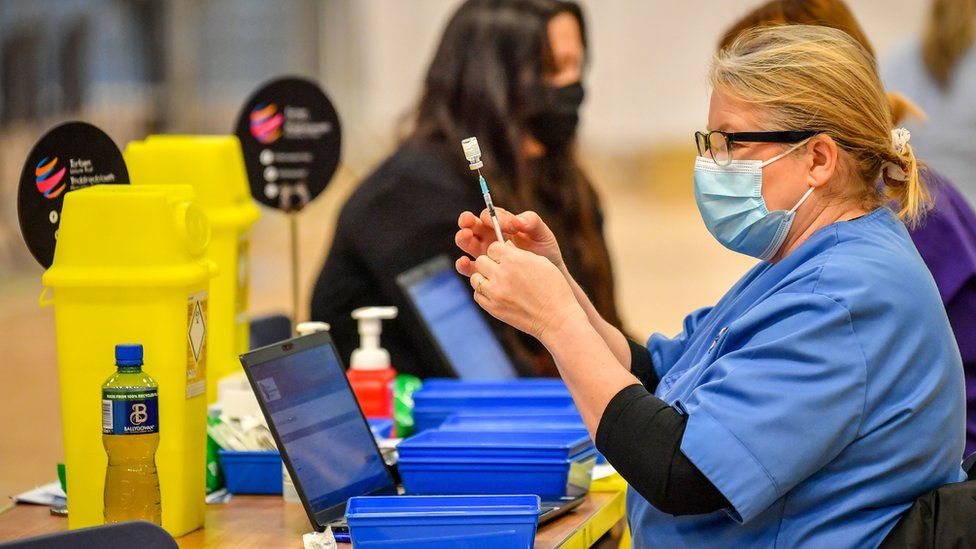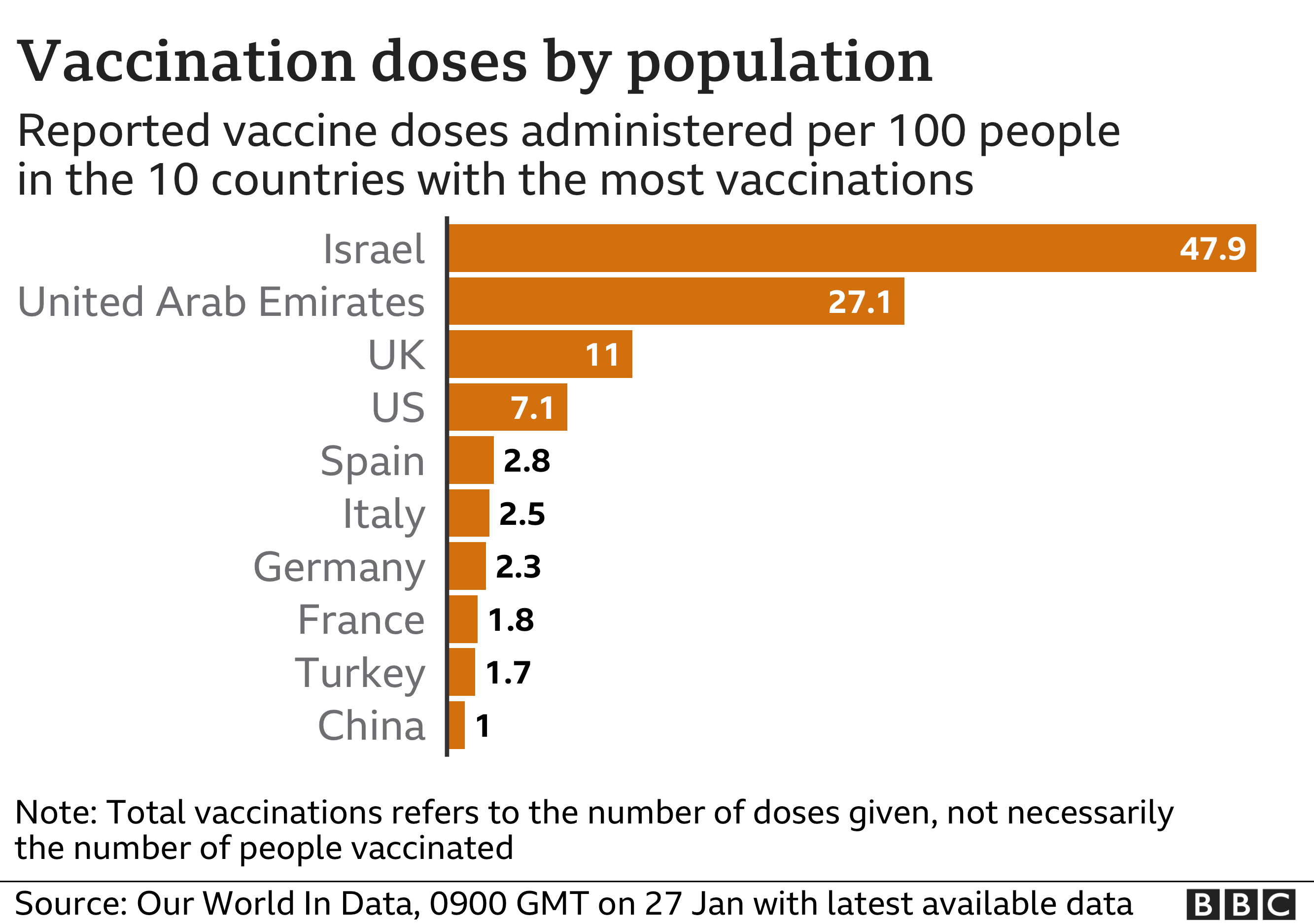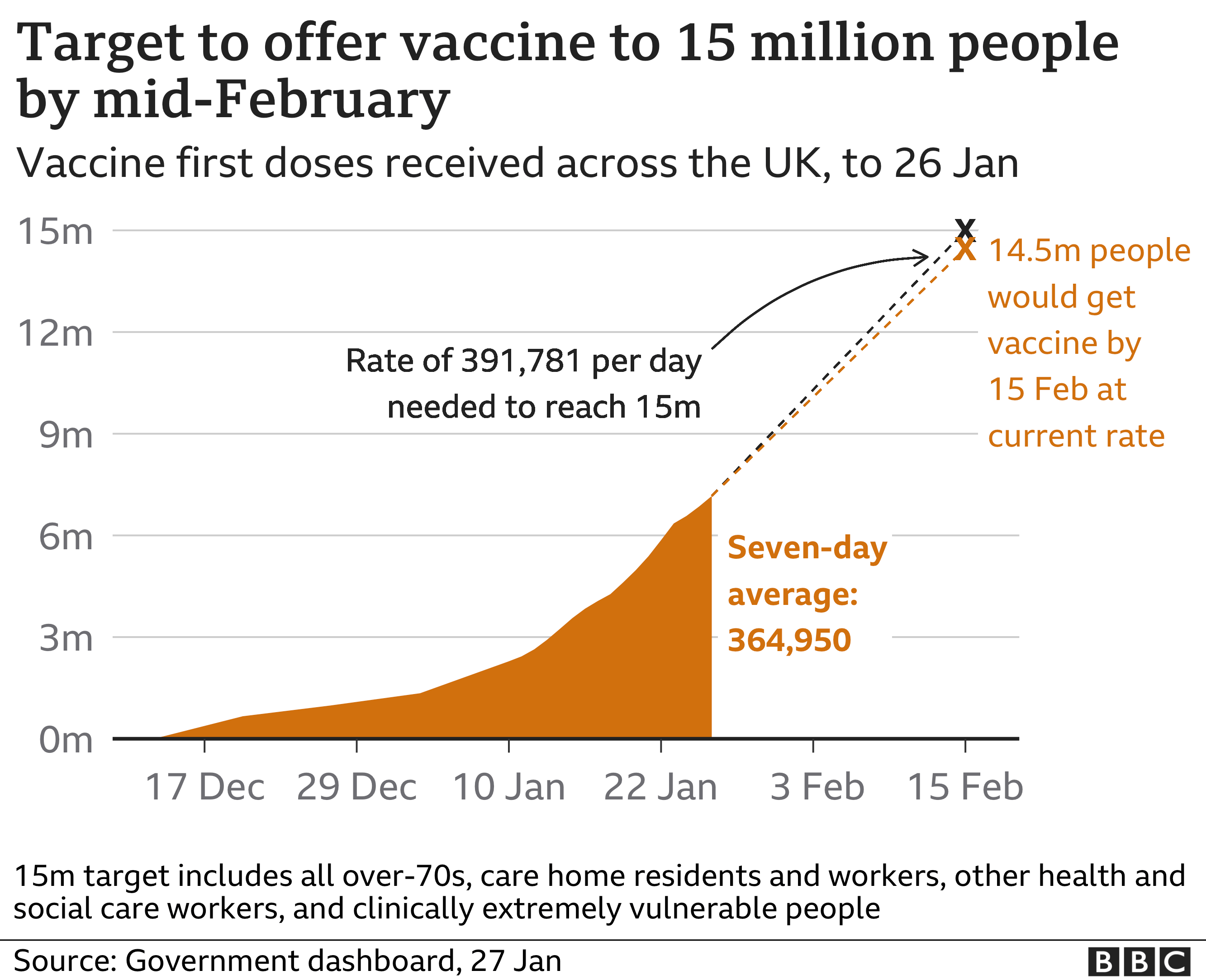
There "will be no interruption" to UK vaccine supplies, Cabinet Office minister Michael Gove has said, after the EU urged AstraZeneca to supply it with doses from UK plants.
"It is the case that the supplies that have been planned, paid for and scheduled should continue," he added.
The EU and AstraZeneca are involved in a row over vaccine supply shortages.
Sir Jeremy Farrar, a scientific adviser to the UK government, said vaccine nationalism did not serve anyone.
The EU has demanded that UK-made jabs are diverted to Europe to fulfil contractual obligations.
AstraZeneca has previously said it could deliver the EU only a fraction of the doses between January and March that it had promised, blaming production issues at European plants for a reported 50 million-dose shortfall.
However, they have both pledged to work together to resolve the crisis.
The AstraZeneca vaccine, developed with Oxford University, has not yet been approved by the EU, although this is expected on Friday.
Mr Gove said: "We must make sure that we continue with the effective acceleration of our vaccination programme. That relies on the supply schedule that has been agreed to be honoured. That's the first and most important thing.
"But secondarily I'm sure we all want to do everything possible to make sure that as many people in countries which are our friends and neighbours are vaccinated and I think we best achieve that through dialogue and co-operation and friendship," he told BBC Radio 4's Today programme.
Pressed on whether the government will allow vaccines to go to the EU, he said: "No, the critical thing is we must make sure that the schedule that has been agreed and on which our vaccination programme has been based and planned goes ahead.
"It is the case that the supplies that have been planned, paid for and scheduled should continue, absolutely. There will be no interruption to that."


Sir Jeremy, a member of the government's Scientific Advisory Group for Emergencies (Sage), said it was in the UK's "national interests" to ensure as many people in the world as possible were vaccinated.
Asked if vaccine nationalism was a reality in Europe, he told the Today programme: "Yes, I'm afraid it is and it's something that we absolutely have to negotiate, we have to avoid, and it doesn't serve anybody to have these fights over vaccine supply."
He said the only answer was to "drive down transmission, to keep it low and to make these vaccines available globally, otherwise we will see new variants coming up, new strains of this virus which will come back to all of our countries".
New variants were "a warning of what is coming, which we must take incredibly seriously", Sir Jeremy added.


The UK government is taking a firm line on this - and for good reason they believe.
It invested in the research done by Oxford University that developed this jab and was then quick to sign a deal with AstraZeneca for supply.
The deal was done in May, three months before the EU signed its contract.
That gave the UK a head start.
The UK supply is manufactured here - at plants in Oxfordshire and Staffordshire.
Some doses were sent to Germany and the Netherlands last year for a process called fill-and-finish, which involves putting it into vials. This is now being done at a plant in Wrexham, creating a complete UK supply chain.
And that arrangement, AstraZeneca sources say, had no impact on the production problems the EU vaccine manufacturing plants experienced.
Making a vaccine is a biological process - there are no guarantees in terms of quantity.
The fact the UK was quick off the mark gave the UK plants more time to tweak the process to get a better yield.
If the UK was to give the vaccine to Europe, why not then other countries? And would that be right when more than 1,000 people a day are dying with Covid here?

Labour leader Sir Keir Starmer said the "war of words" between the EU and AstraZeneca has "got to be resolved" but he did not want a solution which affected the UK's supply.
Speaking to LBC Radio, he said: "I want to resolve this by ramping up manufacture across the world, I don't want to interrupt the way we are doing it in this country, I don't want to push that 12-week gap (between doses) back any further."
AstraZeneca has blamed supply issues on manufacturing problems in two plants - one in Belgium and another in the Netherlands.
The EU, which signed a deal for 300 million doses in August, said it should not receive fewer doses just because the UK signed a contract with the UK-Swedish company earlier. EU Health Commissioner Stella Kyriakides said AstraZeneca's two UK plants "had to deliver" doses.


The UK government has promised to to deliver a first vaccine dose to 15 million of the most vulnerable by mid-February and to offer all adults their first dose by autumn.
Latest figures show that more than 7.1 million people in the UK have now received a first jab.

- LOCKDOWN: The rules in your area
- TESTING: How do I get a virus test?
- LOOK-UP TOOL: How many cases in your area?
- TRAVEL: What are the UK's rules?

Asked about Labour's calls for teachers to be vaccinated over half-term, Mr Gove said the government wanted to concentrate on vaccinating "the most vulnerable first", adding that any decision on who should be prioritised next would be based on scientific advice.
He reiterated comments from England's deputy chief medical officer, Prof Jonathan Van-Tam, by saying that schools "were in themselves safe" but that children could pass on the virus to each other and then back into the community.
On Wednesday, Prof Van-Tam also told a Downing Street briefing there was not a "markedly increased rate of infection or mortality" from Covid-19 among teachers.
However, Labour's deputy leader, Angela Rayner, has contested that, saying that teachers "by virtue of them having to go out and do a frontline facing job, are more at risk of catching Covid".
Pressed on why she was bringing herself into conflict with the scientific advice, she told the Today programme she believed that "actually the data shows, absolutely shows, that front-line key workers who are out there are more at risk" adding, "teachers are frontline key workers".
She said data showed "all frontline key workers, including teachers... are more at risk of infection and death - that's a fact".
UK to review 'red list'
Meanwhile, Mr Gove said ministers would meet later to update the "red list" of countries - which are banned from entry to the UK over fears of new variants of the virus.
The government has a new "fast-track" system for making decisions which should be quicker than the old process for deciding the travel corridors, he said.
He also said that ministers would seek to agree a timetable for introducing the new hotel quarantine policy and any exemptions that would allow people to leave the country, with details potentially being announced in the next couple of days.
Government sources have said the emphasis was still on protecting against new variants, not about countries that have high case rates, according to BBC chief political correspondent Adam Fleming.
It comes as the UK recorded a further 1,725 deaths within 28 days of a positive test on Wednesday. There were also a further 25,308 daily cases reported.



Have you been affected by vaccine supply issues? Share your experiences by emailing haveyoursay@bbc.co.uk.
Please include a contact number if you are willing to speak to a BBC journalist. You can also get in touch in the following ways:
- WhatsApp: +44 7756 165803
- Tweet: @BBC_HaveYourSay
- Upload pictures or video
- Please read our terms & conditions and privacy policy
If you are reading this page and can't see the form you will need to visit the mobile version of the BBC website to submit your question or comment or you can email us at HaveYourSay@bbc.co.uk. Please include your name, age and location with any submission.
https://news.google.com/__i/rss/rd/articles/CBMiJGh0dHBzOi8vd3d3LmJiYy5jb20vbmV3cy91ay01NTgzODI3MtIBKGh0dHBzOi8vd3d3LmJiYy5jb20vbmV3cy9hbXAvdWstNTU4MzgyNzI?oc=5
2021-01-28 11:51:00Z
52781329440642
Tidak ada komentar:
Posting Komentar